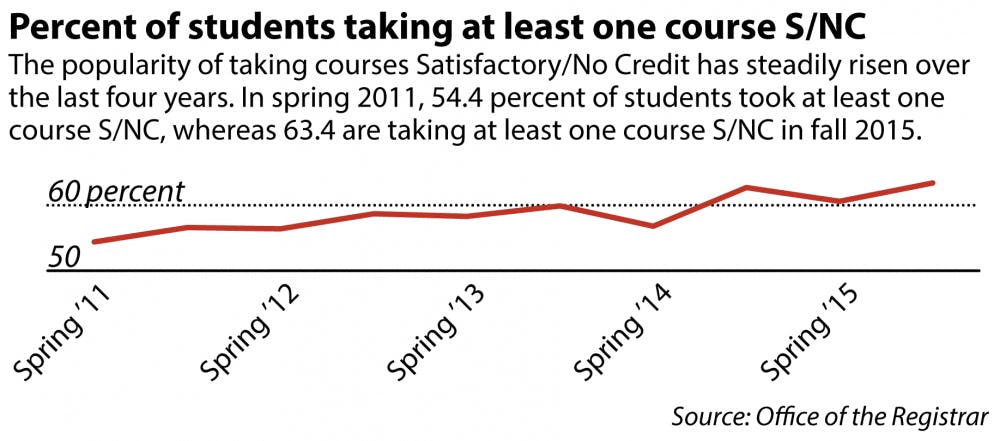The percentage of students taking one or more classes Satisfactory/No Credit jumped from 54.4 percent in spring 2011 to 63.4 percent in fall 2015, according to data obtained from the Office of the Registrar.
The overall percentage of courses taken S/NC also increased from 17.6 percent to 20.7 percent in the same time period, according to the registrar’s office. But the percentage of students taking all of their classes S/NC remained at below 1 percent. This data only accounts for undergraduates enrolled in at least four courses a semester.
Christopher Dennis, deputy dean of the College, said more students may be taking courses S/NC to avoid earning low letter grades. “There’s no question that some of the use of S/NC is grade protection,” he said.
The option for students to take an unlimited number of courses S/NC is a trademark component of the open curriculum. Since Elliott Maxwell ’68 P’06 and Ira Magaziner ’69 P’06 P’07 P’10 helped introduce the open curriculum in 1969, students have weighed several factors when choosing whether to take a course S/NC or for a traditional letter grade.
The Office of the Dean of the College office hopes that students take advantage of S/NC in the spirit of the curricular reforms that led to its creation, Dennis said. S/NC is meant to encourage students to take academic risks without fear of lower grades, he added.
Several students said they gravitated toward the S/NC option just once during their undergraduate careers.
Kian Ivey ’16, an applied math-economics concentrator, took an English course S/NC during his first semester as a transfer student at Brown. “I wanted to try a course somewhat outside of my comfort zone,” he said.
Ivey said the course’s S/NC status influenced how he approached his work “closer to the end of the semester, when other courses had finals or papers” that would affect his “actual grades.”
Saminya Bangura ’16, an international relations and East Asian studies double concentrator, has also taken one class S/NC. She said she chose to take an elective S/NC during a semester in which she took five classes.
“S/NC courses are a cool option for people who can’t really handle the stress of grades all the time but want to take extra classes,” Bangura said.
But Liam Callanan ’18, a computer science concentrator, said he has “never really felt a reason” to take a class S/NC.
Each semester, professors designate a number of courses mandatory S/NC — particularly fiction courses in the Department of Literary Arts and nonfiction courses in the Department of English. Twenty-two of the 29 literary arts courses being offered in fall 2015 are designated mandatory S/NC.
These 22 classes are all art workshop courses, said Thalia Field, professor of literary arts and chair of the department.
“We don’t believe that you quantitatively evaluate art,” Field said. “So if you’re in a workshop class — and this has been true for decades — you take it pass-fail.”
Mary Moynihan ’19, who is enrolled in two mandatory S/NC courses this semester, said the S/NC status somewhat affects her approach to the assignments.
Since ENGL 0900: “Critical Reading and Writing I: The Academic Essay” is an essay-based course, “sometimes you might not do that final edit or revision because you know you’re going to pass with the grade you’re going to get,” Moynihan said.
Dennis said some students may hesitate to take courses S/NC due to pressures from outside the University, such as competition for jobs and graduate school admissions.
“Of course Brown doesn’t exist in a vacuum — the world cares about grades,” he said, adding that despite the University’s lack of an official GPA, every student knows his or her GPA.
But Field said she has not witnessed any negative repercussions of S/NC literary arts courses on a student’s transcript. The literary arts department frequently places concentrators in top-ranked graduate programs, she said, noting that a literary arts graduate three years ago was awarded a Rhodes Scholarship.
“We have seen no correlation between our workshop pass-fail option and future success,” she added.

ADVERTISEMENT




